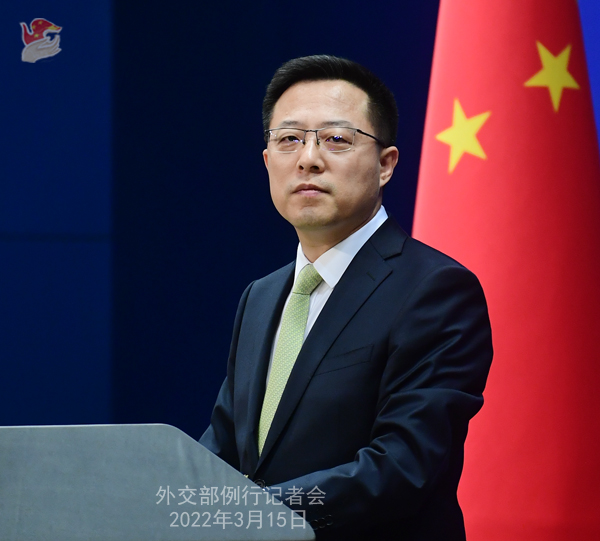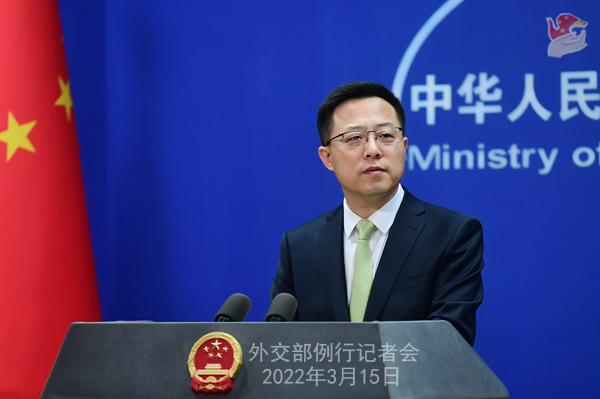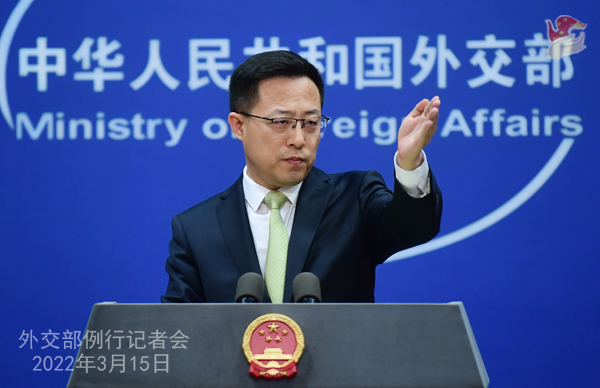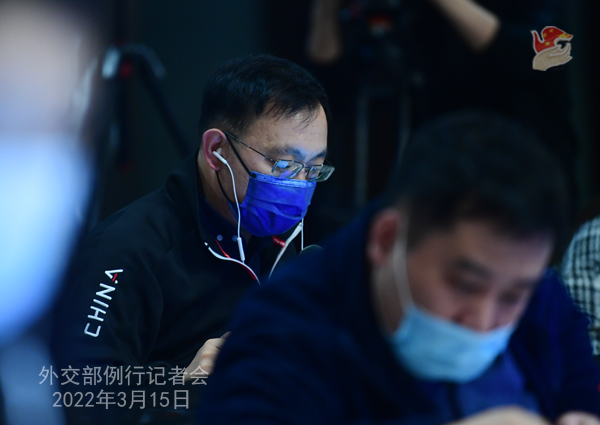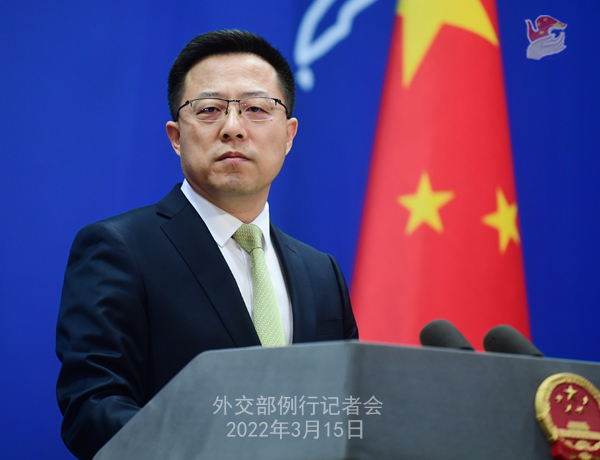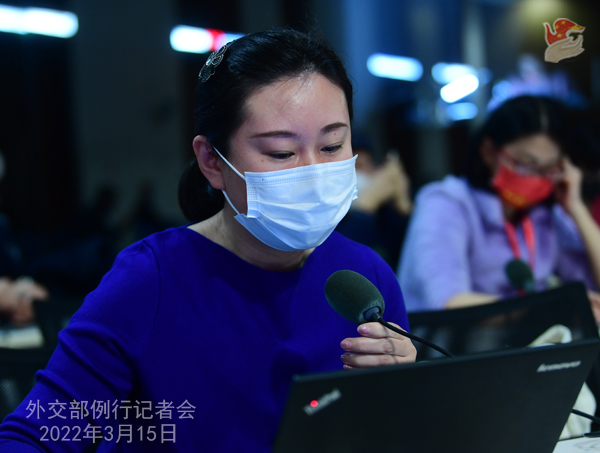| Foreign Ministry Spokesperson Zhao Lijian’s Regular Press Conference on March 15, 2022 |
| 2022-03-15 22:03:28 |
|
CCTV: According to reports, a US official said at a briefing on the meeting between Director Yang Jiechi and National Security Advisor Jake Sullivan that Sullivan “reiterated our One China policy based on the Taiwan Relations Act, Three Communiqués, and Six Assurances. And he underscored concerns about Beijing’s courses and provocative actions across the Taiwan Strait”. What is China’s comment? Zhao Lijian: Member of the Political Bureau of the CPC Central Committee and Director of the Office of the Central Commission for Foreign Affairs Yang Jiechi met with US National Security Advisor Jake Sullivan in Rome, Italy on March 14 local time. The two sides had candid, in-depth and constructive exchange on China-US relations and international and regional issues of common concern. They agreed to jointly follow through on the consensus of the two heads of state, enhance understanding, manage differences, expand consensus, strengthen cooperation and create more conditions to bring China-US relations back to the right track of sound and steady development. Director Yang stressed that the Taiwan question bears on China’s sovereignty and territorial integrity. In the three China-US Joint Communiqués, the US clearly recognized that there is only one China. The one-China principle is the prerequisite for the establishment of diplomatic ties between China and the US and the political foundation for China-US relations. The current US administration has made a commitment on the Taiwan question to adhering to the one-China policy and not supporting “Taiwan independence”, but its recent actions are obviously not consistent with its statements. China is gravely concerned about and firmly opposed to the US’ recent erroneous acts and words on the Taiwan question. Any attempt to connive at or support the “Taiwan independence” separatist forces and to play the “Taiwan card” to “use Taiwan to contain China” will get nowhere. China urges the US to fully recognize the highly sensitive nature of the Taiwan question, strictly abide by the one-China principle, the provisions of the three China-US Joint Communiqués and the commitments made by the US, and not to go further down the road of great danger. AFP: According to news report, the US told allies that China has signaled willingness to provide military assistance to Russia after Russia requested for equipment like surface-to-air missiles. Can China confirm this? And you mentioned yesterday when we asked about media reports on a similar topic that the US has been spreading disinformation targeting China. So does this mean that China has neither received nor responded to any Russian requests for assistance in the Ukraine war? Or are you saying that parts of these news reports are actually not accurate? And if so, can you please clarify? And which parts exactly are disinformation that you mentioned? Zhao Lijian: Yesterday I answered similar questions. Enough has been said. The US’ practice is nothing short of spreading disinformation. Macau Monthly: According to unspecified US officials, on March 14, the US government told allies in NATO and several Asian countries in a diplomatic cable and through intelligence agents that China had signaled its willingness to provide military and economic aid to Russia at the latter’s request. It also noted China was expected to deny those plans. He also said, the move is part of a deliberate strategy move to counter disinformation by being far more open about intelligence matters than usual. What is China’s comment? Zhao Lijian: I’m sure you have noted that Russian presidential spokesman Dmitry Peskov denied the claim that Russia requested military aid from China on March 14. The US has been creating and spreading disinformation from time to time. This is neither professional nor ethical, still less responsible. By doing so, the US will further lose the trust of the world. What the US should do is to deeply reflect upon its role in the evolving situation of the Ukraine crisis, and do more things that can help to ease the situation. People’s Daily: Ambassador Chen Xu, Permanent Representative of China to the United Nations Office at Geneva and other International Organizations in Switzerland, recently delivered a joint statement on behalf of over 40 countries at the 49 session of the Human Rights Council. In his remarks, Ambassador Chen Xu called on the OHCHR to increase its input in economic, social and cultural rights and the right to development, and expressed the opposition to the practice of using human rights as a political tool. Can you share more on that? Zhao Lijian: The global human rights cause is facing grave challenges. Nearly 800 million people globally live in extreme poverty. The coronavirus is still wreaking havoc around the world and could push 71 million people back into poverty. The pandemic has exposed the serious under-investment in economic, social and cultural rights and the right to development by multilateral human rights mechanisms. China welcomes the OHCHR’s focus on combating inequalities as the core of its work and looks forward to more constructive efforts by the Office in safeguarding economic, social and cultural rights and the right to development, especially in helping developing countries overcome the challenges of the epidemic and achieve sustainable economic and social development. Ending poverty and hunger, and ensuring that all human beings can enjoy prosperous and fulfilling lives and fulfill their potential in dignity and equality are key elements of the United Nations 2030 Agenda for Sustainable Development. The eradication of poverty is in itself the promotion and protection of human rights. China maintains that all countries should seek coordinated development of two things. One is poverty reduction and economic, social, cultural and environmental development; the other is human rights protection. We call on all countries to put people first, ensure and improve people’s livelihood, effectively protect the rights of vulnerable groups, and, in particular, reduce the impact of COVID-19 on the poor so that no one is left behind. We look forward to the continued positive role of OHCHR in this regard. In the meantime, we hope all parties can promote partnership through constructive dialogue and cooperation, respect the way of human rights development independently chosen by countries in light of their national conditions, and oppose the practice of using human rights as a political tool. CNR: On March 11, the 49th Session of the Human Rights Council held an interactive dialogue with the Special Rapporteur on torture and other cruel, inhuman or degrading treatment or punishment. The Chinese representative expressed concern over the serious problem of police brutality and torture in the US. Do you have more information on that? Zhao Lijian: There has been an endless string of malicious incidents involving deaths caused by police brutality of US law enforcement. In 2021, over 1,124 Americans died of police violence. Most of the victims were killed by the police in circumstances involving non-violent crimes or even without criminal behavior. The Lancet published a study showing that around 30,800 people died from police violence between 1980 and 2018 in the US. Black people is 3.5 times more likely than White people to be killed by police brutality. There are frequent media revelations about torture, abuse and violence in various detention facilities in the US including private prisons. The Guantanamo Bay prison is infamous for the systemic abuse and torture of prisoners. The CIA, using the so-called “war on terror” as a pretext, has set up black sites in many countries, where so-called “terrorist suspects” were secretly held in arbitrary detention and confessions were extorted by torture. As the MFA spokespersons and media outlets have revealed many times, the US “floating prisons” aboard 17 navy ships and network of black sites in countries like Lithuania are more typical examples of how the US prison system wantonly tramples on rule of law and human rights. As has been fully proven by facts, the US is in no position to claim itself a beacon or defender of human rights, still less to make wanton remarks about other countries’ human rights conditions under false pretenses. China calls on the Human Rights Council and the Special Rapporteur on torture and other cruel, inhuman or degrading treatment or punishment to pay closer attention to the US’ violation of human rights and urge it to adopt concrete measures to resolve relevant issues.
CRI: According to reports, Yang Yanyi, Representative of State Councilor and Foreign Minister Wang Yi, former Ambassador and Head of the Chinese Mission to the EU and former Ambassador to Brunei, visited the Philippines, Indonesia, Cambodia, Singapore and the ASEAN Secretariat not long ago. I wonder if you have some information on that. Bloomberg: More than 2.5 million people have fled Ukraine since Russia invaded on February 24. That’s according to the UN which also says that close to 600 people have died, and 1000 others have been injured. So my questions to you are how worried is China about Russia’s assaults on cities and the toll on civilians this is taking? And what efforts, if any, has China made to convince Russia to stop its attacks on cities, residential areas and medical facilities that people around the world have been witnessing? Zhao Lijian: The Ukraine issue has a complex historical background and context. China is deeply grieved to see that the situation in Ukraine has reached its current state. The crisis is the result of the interplay of complex factors. The Chinese leadership, State Councilor and Foreign Minister Wang Yi, MFA spokespersons and other diplomatic officials as well as competent authorities have been working for peace talks. Our spokespersons have also shared with you China’s efforts in great detail. China has also provided humanitarian assistance to Ukraine. I can share with you that the third batch of humanitarian supplies from China arrived in Poland yesterday and will be soon delivered to Ukraine. China’s position and statement on the Ukraine issue is completely objective, just and constructive. We have a clear goal, that is, to deescalate the situation and put an end to the conflict as soon as possible. We believe China’s position will receive understanding and support from more and more countries. AFP: Just to follow up on the issue of disinformation and the Ukraine crisis. So China has previously accused the US of starting the fire and fanning the flames in the Ukraine invasion. In this case, on the other hand, will China commit to not sending help to Russia in its invasion and not adding fuel to the fire? Zhao Lijian: I just clearly stated China’s position on relevant issues. Our position on the Ukraine issue is beyond reproach. Reuters: Could we get some more details on this third shipment of humanitarian aid you just mentioned? For example, how much is it worth? What is it comprised of? Zhao Lijian: China has released a readout on this. You may refer to that. Global Times: According to reports, an Iranian Foreign Ministry spokesperson said on March 14, “We are currently having a breather from the nuclear talks” and “We are not at a point of announcing an agreement now since there are some important open issues that need to be decided upon by Washington”. On the same day, US State Department spokesperson Ned Price said that Washington would be open to “diplomatic alternatives” if a deadlock sparked by sanctions against Russia makes a formal return to the 2015 nuclear deal impossible. Do you have any comment on this?
CCTV: According to Japanese media reports, digging work is being carried out near unit 5 and unit 6 of the Fukushima Daiichi Nuclear Power Station to build a vertical shaft for storing diluted and treated nuclear contaminated water which will later be released into the ocean. Do you have any comment? Zhao Lijian: China is very concerned about the moves on the Japanese side. For a long time, the international community has been raising its doubts and concerns to the Japanese side over the legitimacy of the discharge into the sea, the rationality of the discharge plan, the credibility of the data about the nuclear contaminated water and the reliability of the equipment to purify the nuclear-contaminated water. The Japanese side has yet to give a full and credible explanation. The IAEA technical working group paid its first visit to Japan last month and raised a host of questions to the Japanese side. The assessment on the disposal of nuclear-contaminated water is still ongoing. It is extremely irresponsible that Japan turns a deaf ear to the concerns of all parties and advances the preparatory work of the ocean discharge in a hasty manner. Japan should earnestly respond to the legitimate concerns of the international community in real earnest, revoke the wrong decision on releasing the nuclear-contaminated water into the ocean, and stop the preparatory work immediately. It should earnestly abide by its due international obligations and avoid taking the liberty of starting the discharge of nuclear-contaminated water into the sea before reaching consensus with stakeholders and relevant international organizations including the IAEA. Beijing Daily: The IAEA Board of Governors Meeting in March once again incorporated nuclear-powered submarine cooperation between the US, the UK and Australia as a full agenda item the other day. The Chinese representative delivered a statement. Can you share more information? Zhao Lijian: The nuclear-powered submarine cooperation between the US, the UK and Australia could create nuclear proliferation risks and shocks to the international non-proliferation system, induce a new round of arms race and undermine regional prosperity and stability. China is gravely concerned about this and firmly opposed to this. After the meeting in November last year, the IAEA board decided by consensus to incorporate the AUKUS issue as a full agenda item at the March meeting at China’s proposal to discuss issues related to AUKUS nuclear-powered submarine cooperation. This fully reflects the grave concerns of the international community including IAEA board members, which should not be neglected by the three countries. As has been pointed out by the Chinese representative at the meeting, the trilateral nuclear submarine cooperation concerns the integrity, efficacy and authority of the Non-Proliferation of Nuclear Weapons (NPT), and the safeguards arrangement issues bear on the interests of all members of the agency and should be decided by all member states through discussion. To this end, China has suggested that the IAEA launch a special committee open to all member states to focus on discussing the political, legal and technical issues concerned to properly seek a solution acceptable to all parties. The US, the UK and Australia should not proceed with relevant cooperation, and the IAEA Secretariat should not have consultation with the three countries on the so-called safeguards arrangement for their nuclear submarine cooperation until consensus is reached by all parties. China calls on all IAEA member states to continue to have substantive discussions on AUKUS nuclear-powered submarine cooperation through the inter-governmental process, uphold the international non-proliferation system with the NPT as its cornerstone together with real actions, and safeguard international peace and security. Dragon TV: It is reported that Dian Triansyah Djani, Indonesia’s G20 co-sherpa, said that as the rotating president of G20, Indonesia believes each country has the right to express concerns about various issues, including the situation in Ukraine, but the G20 is a multilateral mechanism for economic cooperation and Indonesia will focus on fulfilling the commitments outlined in the G20 leaders’ declaration in Rome as well as its own priorities and does not intend to include the Ukraine crisis in the current agenda. Do you have any comment? Zhao Lijian: G20 is the premier forum for international economic cooperation, not an appropriate platform to discuss political security issues such as Ukraine. Under the current circumstances, G20 is shouldering important responsibilities in advancing international anti-epidemic cooperation and upholding the stability and recovery of the world economy. G20 should stick to its mandate, deepen solidarity and cooperation, and work for a joint response to prominent challenges such as global public health and economic and financial issues. China supports Indonesia, the rotating president of G20, in promoting cooperation across the board in accordance with the established agenda under the theme of “Recover Together, Recover Stronger”. China will continue to get deeply involved in the preparation process of the Bali Summit and work with all relevant parties to make the summit a success and make positive contribution to improving global economic governance and promoting post-COVID economic and social recovery. AFP: We noticed that State Department Spokesman Ned Price said yesterday that National Security Adviser Jake Sullivan and the US delegation had “raised directly and very clearly our concerns about the PRC’s support to Russia in the wake of the invasion”. So he said that “we have communicated very clearly to Beijing that we won’t stand by and will not allow any country to compensate Russia for its losses”. If your position is that media reports have been disinformation targeting China, what is your response to this official statement on the concerns of the US administration? Zhao Lijian: Director Yang Jiechi pointed out in the Rome meeting that China does not want to see the situation in Ukraine to become what it is today. It is important to straighten out the history of the Ukraine issue, address the problem at the root, and respond to the legitimate concerns of all parties. He also stressed the need to take a long-term perspective, actively follow the vision of common, comprehensive, cooperative and sustainable security, and encourage the parties concerned to engage in equal-footed dialogue and seek to put in place a balanced, effective and sustainable European security architecture in line with the principle of indivisibility of security, so as to safeguard peace in Europe and the world at large. The Chinese side always maintains that the sovereignty and territorial integrity of all countries must be respected and the purposes and principles of the UN Charter must be observed. China is committed to facilitating dialogue for peace, and believes that the international community should jointly support the peace talks between Russia and Ukraine for early substantive outcomes, so as to deescalate the situation as soon as possible. All parties should exercise maximum restraint, protect civilians and prevent a massive humanitarian crisis. China has provided emergency humanitarian assistance to Ukraine and will continue to make its efforts to that end. China firmly opposes any words and deeds that spread disinformation and distort and smear China’s position. AFP: Just a clarification on your answer to my earlier question, is China concerned about any potential sanctions from the US if the situation develops? The US has said that they are watching for any actions on the Chinese side. So is China concerned about potential sanctions and is that part of the consideration in whether or not it could provide assistance to Russia if there is such a request being made as media reports have suggested? Zhao Lijian: China has stated its position on sanctions on multiple occasions. China does not agree with resolving issues with sanctions, still less unilateral sanctions that have no basis in international law. Reality has long proven that sanctions not only fail to resolve problems, but will create new ones. It will result in a situation where multiple players lose, and will disrupt the process of political settlement. The world economy is already struggling due to the impact of COVID-19. Sanctions will only create shocks to world economic recovery and do no good to any parties. We strongly urge the US not to undermine China's legitimate rights and interests when handling the relations with Russia. China and Russia will continue to conduct normal economic and trade cooperation in the spirit of mutual respect, equality and mutual benefits.
AFP: Just one more question regarding report saying that Saudi Arabia has invited President Xi Jinping to visit Riyadh. This is supposed to take place after the holy month of Ramadan beginning in early April. Has China received such an invitation and other plans for President Xi to make such a visit? Zhao Lijian: I have no information to offer. PTI: UN Secretary-General Mr. Guterres yesterday said that he is in close touch with China, France, Germany, Israel and Turkey on mediation efforts to end the Ukraine conflict. Do you have any comment on this? Zhao Lijian: China’s position has been well stated. We support all diplomatic efforts to promote peace talks that are conducive to easing tensions. AFP: The Philippines said on Monday that it had summoned China’s ambassador to the country after a Chinese navy ship was caught illegally lingering in Philippine waters. The ship was in the Sulu Sea for three days and officials have said this was an illegal intrusion and violation of Philippine sovereignty. Does the Chinese side have any comments on this issue? Zhao Lijian: The Chinese naval vessel's sailing through the Philippine waters was an exercise of the right of innocent passage pursuant to UNCLOS. The Chinese passage was safe and standard, and consistent with international law and international practice. We hope relevant parities can view it in an objective and rational manner. Reuters: You talked about the US embassy in Ukraine deleting certain documents, if I’m not mistaken, from its website. These documents talk about the labs that the US says are designed to prevent things like epidemics from breaking out, but it seems that Russia and China have suggested many times that they have a military purpose. Where did you originally get this information from? What I found was on February 26, there was, I think, a Bulgarian journalist who uploaded on Twitter some reporting efforts where she claimed that the US embassy in Ukraine had deleted such documents, even though at present no documents she says were deleted. They are still there. So my question is, was this tweet from this Bulgarian journalist your source or did you get intelligence from Russia? Was it your own intelligence services that provide you this information? Zhao Lijian: Based on our information, the US indeed deleted the documents. You may have to ask the US whether they recovered the documents, or the documents you saw were something missed out by the US, because the US is the one that is responsible for giving an explanation and clarification. You should also ask the US whether its practice is intended to kick up a cloud of dust or to cover more things up? I want to stress that the concerns of the international community about US’ biological labs in Ukraine boil down to what the US has done and what has been hidden from the public. Why is the US the only party that is opposed to establishing a BWC verification regime? Why not open these bio-labs to independent investigation by international experts? I suggest you ask the US these questions. Follow-up: Thanks for your answer. But I was asking about your source of information. Could you elaborate a little bit more about that? Zhao Lijian: As I said yesterday, according to the 2005 agreement between the US Department of Defense and the Ukrainian side, representatives of the US Department of Defense have the right to participate in all aspects of related activities at facilities in Ukraine. Information marked or designated by the US side as “sensitive” should be withheld from public disclosure by Ukraine. According to the document the US submitted to the meeting of the state parties to the BWC at the end of 2021, the US has cooperation facilities in Ukraine including 26 labs. However, the US Department of Defense said the other day that the US and Ukraine have cooperation in 46 labs. Isn’t this self-contradictory? We also noted that the US Department of Defense representatives have the right to participate in related activities at facilities in Ukraine. The Ukrainian side shall store all dangerous pathogens at laboratories designated for cooperative research and transfer to the US requested copies of dangerous pathogen strains. Key information, including that marked or designated by the US side as “sensitive”, should be withheld from public disclosure by Ukraine. The US side failed to make clarifications in its statements yesterday. How could this convince anyone? People cannot help but wonder, did the US send personnel to these labs or not? What is their scope of activity exactly? How many cooperation facilities does the US have in Ukraine? Besides, according to open sources, these labs in Ukraine operate on the command of the US Department of Defense and the US has invested over $200 million in them. You were asking about the information I have. We noted that Russia has lately disclosed some US research plans in bio-labs in Ukraine. One of them, the UP-4 project, studies the possibility of the spread of avian viruses through migrating birds. The R-781 project considers bats as carriers of pathogens that can be transmitted to humans. Another project code-named UP-8 is aimed at studying the Congo-Crimean hemorrhagic fever virus and hantaviruses. The evidence revealed by Russia shows that the US is trying to obtain means of releasing biological chemical weapons by experimenting on the relations between migrating birds and the spread of viruses. It also shows that the US and some other Western countries are gathering and transferring in a planned manner biological samples in Ukraine and may have conducted biological research targeting different ethnic populations. When confronted with evidence revealed by Russia, the US is trying to muddle through by simply dismissing the concerns as “disinformation”. Is this convincing at all? If the US wants to prove its innocence, it needs to give a full account of its bio-military activities in a responsible manner. We welcome a joint assessment of the documents provided by Russia under the framework of the UN and the BWC. More importantly, we call on the US to open up these bio-labs for independent investigations by international experts and stop standing alone in obstructing the establishment of a BWC verification mechanism.
The Paper: According to reports, the extraordinary presidential election was successfully held in Turkmenistan the other day. Vice Prime Minister and the candidate of the Democratic Party Serdar Berdimuhamedov was elected as the new President by a vast majority of votes. What is China’s comment? Will China send a congratulatory message to Turkmenistan? How do you view the development of China-Turkmenistan relations? Zhao Lijian: China expresses warm congratulations to Turkmenistan on the smooth presidential election and Serdar Berdimuhamedov’s election as the president. President Xi Jinping has sent a congratulatory message to Serdar Berdimuhamedov. As a strategic partner based on sincerity and mutual trust, China firmly supports Turkmenistan in pursuing a development path suitable for its national conditions. We believe under the leadership of President Serdar Berdimuhamedov, Turkmenistan will continue to maintain stability, realize development goals in various fields and make new achievements in nation building. China attaches great importance to China-Turkmenistan relations. We are ready to work with Turkmenistan to take the opportunity of the 30th anniversary of diplomatic ties to deepen comprehensive and mutually beneficial cooperation, and elevate the bilateral relations to a higher level for the benefit of the two countries and two peoples. Bloomberg: The United Nations Under-Secretary-General of Disarmament Affairs Izumi Nakamitsu said last week that no nation had filed any complaint about biological weapons in Ukraine to the Security Council. Has China filed any complaints that included its supposed evidence since then given its repeated concerns about this topic? Zhao Lijian: I am not aware of the situation you mentioned. The Chinese Permanent Representative to the UN has made China’s solemn position on this issue at the discussions of US’ biological labs at the UN Security Council. AFP: A follow-up on Reuters’ question on the website of US Embassy in Ukraine. You said the US may have recovered or missed to delete some documents. Do you mean the US may have recently recovered the documents that your screenshot showed? According to China’s knowledge, when were these documents deleted? Zhao Lijian: You can see “404 not found” on the screenshot I tweeted. This means you cannot find the document after clicking the URL. As to when the US recovered the documents, and whether the documents are the original ones, you may have to ask the US side. Bloomberg: I just like to go back to the humanitarian situation in Ukraine because it seems like it’s going to worsen. Kremlin spokesman Dmitry Peskov warned that Russia’s defense ministry does not rule out the possibility of putting large cities which are already fully encircled under its control. And yet Chinese diplomats including Yang Jiechi have called for all parties to exercise restraint to protect civilians. So to what degree is China worried that civilian casualties may mount in Ukraine? And what tools if any is China using to stop that from happening? Zhao Lijian: We have shared many times China’s position on the humanitarian situation in Ukraine. State Councilor and Foreign Minister Wang Yi also elaborated on China’s six-point initiative on the humanitarian situation in Ukraine. I will not dwell on that. When staying in touch with relevant sides, China has been appealing to the parties to prevent a large-scale humanitarian crisis and protect the safety of civilians. We also noticed some progress has been made on this front in the peace talks between Russia and Ukraine. The two sides have opened humanitarian corridors, through which citizens from various countries including China have evacuated from the conflict zones. China hopes to strengthen communication with all sides to ease the situation in Ukraine as soon as possible. We do not wish to see civilians trapped in the conflicts and deeply sympathize with them.
|
